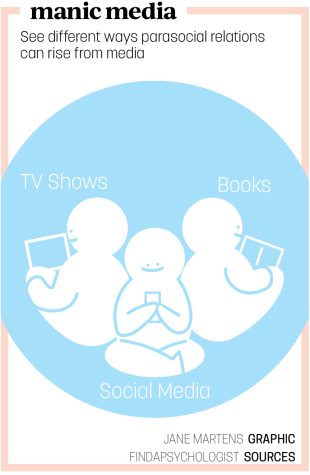Junior Eva Nist has always loved Taylor Swift. She said that this connection comes through growing up with her and her music. “Over the years I think I’ve fallen into that rabbit hole of watching interviews and finding you really relate to that person, so you start to feel this connection even though you don’t personally know a celebrity,” Nist said.
With Swift’s 10th album “Midnights” scheduled for release on Oct. 21, Nist reflected on why she loves the artist. Nist said, “She is very authentic with her music and always writes about what she’s feeling at the time. So even if you haven’t gone through the things that she’s gone through it’s the vulnerability in a way.”
Nist is not alone in this sentiment. Junior Naomi Fields, a Blake Lively fan, said she agreed that authenticity creates a deeper connection among fans.
“I guess I really like that she’s (Lively) just honest, especially since I think a lot of celebrities aren’t honest and embellish their lives. She keeps her life private, she’s honest, she’s blunt,” Fields said.
But freshman Ethan Lee offered a different perspective for admiration. Lee said, “ I’ve had a crush on Emma Watson and Ariana Grande really just because I find them attractive,” Lee said.
These personal connections to celebrities qualify as something called “parasocial relationships”. Parasocial relationships are defined by the dictionary as relationships that involve “a person feeling as though they have a close, intimate connection with someone whom they have never met due to closely following that person (or character) in media, such as TV shows, videos, podcasts, etc.”
Psychology teacher Michael O’Toole restated this in his definition, expanding on how it applies to all students.
O’Toole said, “When people form a bond with a celebrity, they don’t actually know how strong that bond is; it is very individual, whether that be a healthy fatuation or an unhealthy infatuation.”
Parasocial relationships are an age-old phenomenon, with the term first being coined by Donald Hortan a social sciences professor at Yale in 1956. But in today’s age of social media, the phenomenon may be exacerbated because fans have constant access to celebrities whenever they want. This can increase the prevalence of parasocial relationships. While this makes those celebrities feel more real, it also places them on a pedestal.

Nist said she thinks it’s important to remember that celebrities are human, too.
“Everyone is always like, ‘Oh my god they have a platform so they must be special,’ and it’s like, no, they are just rich and they are just people but it feels like at any moment they can be canceled,” she said.
Nist said she partly attributes unhealthy parasocial relationships to the prevalence and trendiness of celebrities and “cancel culture”.
“I think it’s [unhealthy parasocial relationships] more prevalent now with every social media outlet we have, especially TikTok. I feel like it is unfair to celebrities, really everyone, because, before, celebrities just lived their lives and worked, but now they are always available to us and we see their whole life and it makes us feel truly connected,” Nist said. “ It puts them under a microscope and they are just humans.”
“ These types of relationships were always around, but I definitely think social media gives this allusion that you know someone, but the truth is you don’t,” O’toole said.
O’Toole said parasocial relationships may become unhealthy especially due to the fact that the connection comes from an individual who doesn’t actually know the person to whom they feel a connection to. He said these relationships are normal but can occasionally be unhealthy.
“It’s perfectly healthy to have a celebrity you really connect with and even have an emotional connection to as long as it doesn’t become delusional that they really think they are friends.”
Nist said she believes these relationships may seem illogical at times.
“It’s kind of creepy when you think about it, people being like, ‘I just love this celebrity’, and it’s like, ‘You don”t really know them at all,’ ” Nist said.
Ultimately, Lee and Nist both said it depends on the nature of these relationships that determines if they are unhealthy. Lee said, “It’s never a good thing to be too obsessed with something, but if you just like them to like them it can be perfectly healthy and normal.”
Nist said, “I think that celebrity connections can mean a lot as far as representation,” “like that person’s queer, or they look like me, or even that you relate to [them] and that can be very constructive.”































![What happened to theater etiquette? [opinion]](https://hilite.org/wp-content/uploads/2025/04/Entertainment-Perspective-Cover-1200x471.jpg)














































![Review: “The Immortal Soul Salvage Yard:” A criminally underrated poetry collection [MUSE]](https://hilite.org/wp-content/uploads/2025/03/71cju6TvqmL._AC_UF10001000_QL80_.jpg)
![Review: "Dog Man" is Unapologetically Chaotic [MUSE]](https://hilite.org/wp-content/uploads/2025/03/dogman-1200x700.jpg)
![Review: "Ne Zha 2": The WeChat family reunion I didn’t know I needed [MUSE]](https://hilite.org/wp-content/uploads/2025/03/unnamed-4.png)
![Review in Print: Maripaz Villar brings a delightfully unique style to the world of WEBTOON [MUSE]](https://hilite.org/wp-content/uploads/2023/12/maripazcover-1200x960.jpg)
![Review: “The Sword of Kaigen” is a masterpiece [MUSE]](https://hilite.org/wp-content/uploads/2023/11/Screenshot-2023-11-26-201051.png)
![Review: Gateron Oil Kings, great linear switches, okay price [MUSE]](https://hilite.org/wp-content/uploads/2023/11/Screenshot-2023-11-26-200553.png)
![Review: “A Haunting in Venice” is a significant improvement from other Agatha Christie adaptations [MUSE]](https://hilite.org/wp-content/uploads/2023/11/e7ee2938a6d422669771bce6d8088521.jpg)
![Review: A Thanksgiving story from elementary school, still just as interesting [MUSE]](https://hilite.org/wp-content/uploads/2023/11/Screenshot-2023-11-26-195514-987x1200.png)
![Review: "When I Fly Towards You", cute, uplifting youth drama [MUSE]](https://hilite.org/wp-content/uploads/2023/09/When-I-Fly-Towards-You-Chinese-drama.png)
![Postcards from Muse: Hawaii Travel Diary [MUSE]](https://hilite.org/wp-content/uploads/2023/09/My-project-1-1200x1200.jpg)
![Review: "Ladybug & Cat Noir: The Movie," departure from original show [MUSE]](https://hilite.org/wp-content/uploads/2023/09/Ladybug__Cat_Noir_-_The_Movie_poster.jpg)
![Review in Print: "Hidden Love" is the cute, uplifting drama everyone needs [MUSE]](https://hilite.org/wp-content/uploads/2023/09/hiddenlovecover-e1693597208225-1030x1200.png)
![Review in Print: "Heartstopper" is the heartwarming queer romance we all need [MUSE]](https://hilite.org/wp-content/uploads/2023/08/museheartstoppercover-1200x654.png)


